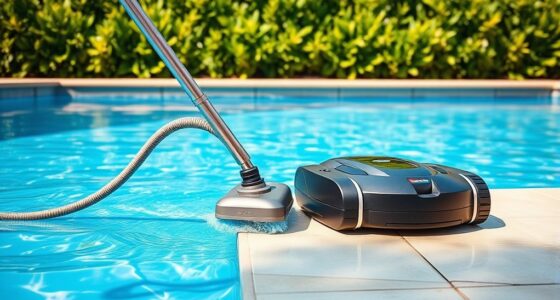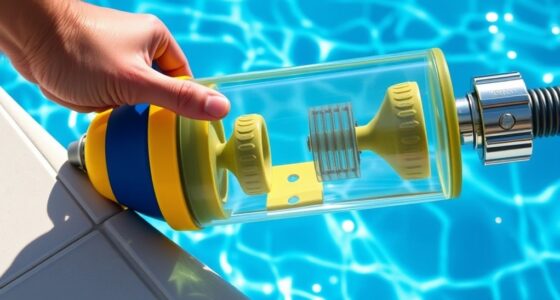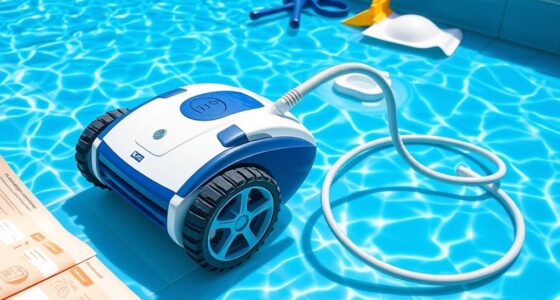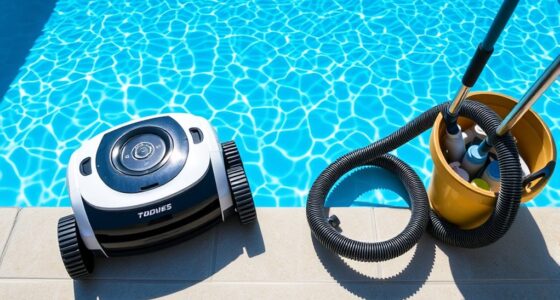Skipping pool maintenance may seem like a way to save money, but it quickly leads to costly consequences. You’ll face algae, bacteria growth, and equipment damage from neglecting chemicals and regular inspections. Over time, small issues turn into major repairs, increasing your expenses considerably. Using more chemicals and replacing worn-out equipment will strain your budget. To avoid these costly pitfalls, it is crucial to understand what happens when you ignore proper upkeep—and the key details follow.
Key Takeaways
- Skipping routine maintenance leads to costly repairs caused by algae growth, equipment damage, and surface deterioration.
- Neglected chemical management results in cloudy, unsafe water and increased expenses for extensive cleaning.
- Ignoring small issues like leaks or cracks can escalate into expensive repairs or equipment replacements.
- Poor equipment upkeep causes inefficiency, higher energy bills, and early equipment failure.
- Overall neglect significantly raises long-term costs, making proper maintenance a cost-effective investment.

Ever wondered how much it really costs to keep your pool clean and functional? Skipping regular maintenance might seem like a way to save money in the short term, but it often leads to costly consequences down the line. When you neglect your pool, it’s not just about having murky water; it impacts your wallet considerably. One of the most critical aspects is chemicals management. Without proper monitoring and balancing of your pool’s chemicals, algae and bacteria can quickly take over, forcing you to spend more on extensive cleaning and chemical treatments later. Imbalanced water pH levels can also corrode pool surfaces and equipment, which means you’ll end up paying for repairs or replacements that could have been avoided with routine checks.
Neglecting pool maintenance can lead to costly repairs and chemical overuse.
In addition to chemicals management, neglecting your pool often results in the need for equipment upgrades. When filters, pumps, or heaters aren’t maintained regularly, their efficiency drops, causing them to work harder and consume more energy. Over time, this increased strain can lead to equipment failure, requiring costly replacements. For example, ignoring signs of wear or blocking debris can cause your pump to overheat or your filter to clog, both of which escalate your maintenance expenses. Upgrading equipment might seem like an upfront investment, but it’s often cheaper than repeatedly fixing broken parts or replacing entire systems due to neglect.
Furthermore, skipping regular cleaning and inspections allows small issues to develop into major problems, escalating repair costs considerably. A neglected pool might develop leaks, cracks, or corrosion that worsen over time. These issues can cause water wastage and increase your utility bills. Plus, if you ignore routine inspections, you might miss early signs of equipment malfunction, leading to more complex and expensive repairs later. Regular pool inspections and maintenance are essential for early detection and prevention of costly repairs, helping you avoid unnecessary expenses.
Ultimately, neglecting pool maintenance doesn’t just jeopardize your pool’s appearance and safety; it also inflates your costs considerably. The expenses of frequent repairs, equipment upgrades, and chemical overuse quickly add up, making it clear that regular maintenance is a wise investment. Keeping your pool clean and well-maintained might seem like an ongoing effort, but it’s a small price to pay compared to the financial drain of ignoring issues. When you prioritize routine upkeep, you ensure your pool remains a safe, enjoyable space without draining your wallet unexpectedly.
Frequently Asked Questions
How Often Should I Perform Pool Maintenance?
You should perform pool maintenance at least once a week. This includes pool vacuuming to remove debris and dirt from the bottom and sides, and filter cleaning to guarantee the water stays clear and balanced. Regular maintenance helps prevent algae growth and equipment issues. If your pool gets heavy use or after storms, consider more frequent checks. Consistent upkeep keeps your pool safe, clean, and inviting for swimming.
What Are the Signs My Pool Needs Repairs?
You’ll notice your pool needs repairs if you see persistent pool algae, which indicates poor water quality, or if your filter starts clogging frequently. Scratched or cloudy water, uneven chemical levels, and reduced circulation also signal issues. Don’t ignore these signs; addressing them early prevents bigger problems. Regular maintenance helps catch these signs before they escalate, keeping your pool clean, safe, and in great condition.
Can Neglecting Maintenance Affect Water Safety?
Neglecting pool maintenance can seriously impact water safety. When you skip regular cleaning, algae, bacteria, and other contaminants thrive, increasing your risk of waterborne illnesses. Poor chemical balance can create dangerous chemical hazards, making the water unsafe for swimming. You might not see the dangers right away, but over time, unmaintained pools pose health risks, so keeping up with maintenance is essential for safe, clean water.
How Do Chemical Imbalances Impact Pool Equipment?
Chemical imbalances are like a silent thief, slowly corroding your pool equipment. When your water’s pH or sanitizer levels are off, chemical corrosion accelerates, weakening parts and causing equipment failure. This silent deterioration not only shortens equipment lifespan but also leads to costly repairs. You must keep chemical levels balanced, so your pool stays safe, functional, and inviting—avoiding the destructive effects of neglect before they take hold.
What Long-Term Damage Can Neglect Cause to My Pool?
Neglecting your pool can lead to serious long-term damage, including stained surfaces and persistent algae growth. Without proper maintenance, your pool’s finish deteriorates and stains become hard to remove, harming its appearance. You also risk algae spreading, which complicates cleaning and can damage equipment. Regular upkeep helps with stain prevention and algae control, ensuring your pool stays in good shape and lasts longer. Don’t ignore routine care to avoid costly repairs later.
Conclusion
So, next time you skip that quick pool clean, remember—you’re not just dodging a chore, you’re inviting chaos. Cracked tiles, cloudy water, and costly repairs are just around the corner, all thanks to neglect. Who needs peace of mind when you can have a swamp in your backyard? Skip maintenance today, pay the price tomorrow—because nothing says “luxury” like a pool full of problems waiting to happen. Cheers to neglect!










